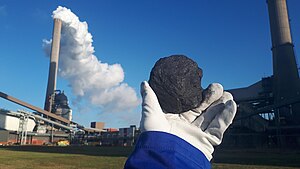
Fossil energie are reservoirs of ancient carbon, stored by the sun's energy eons ago.
By releasing this energy now, we are enhancing the greenhouse effect and bringing about a high likelihood of dangerous climate change.
We are also depleting reserves which may possibly be needed in harsher future times (unknown unknowns).
Generel Information[edit | edit source]
Fossile energy sources such as oil, coal or natural gas have been formed by the process of anaerobic decomposition of buried dead organisms and plants. Any source of fossile energy that we are using today is the result of a process that has started severel hundred millions of years ago and within over 200 years humanity has used a huge amount of this sources. Besides of the use of fossile energy we are also releasing high amounts of CO2 that has been stored during severel hundred millions of years.
Sources[edit | edit source]
Coal is the largest source of energy for the generation of electricity worldwide, as well as one of the largest worldwide anthropogenic sources of carbon dioxide releases. The world coal consumption was about 7.25 billion tonnes in 2010 and is expected to increase 48% to 9.05 billion tonnes by 2030. In 2007 it was estimated that the worldwide amount of coal could last for ~140 years, but this was just a rating based on a constant demand on coal.
Oil a highly important source of energy when it comes to modern mobility and another major factor when it comes to our output of carbondioxide. The oil production in 2002 has been approximitly between 1,119 billion barrels (177.9 km3) to 1,317 billion barrels (209.4 km3). The highest point of oil production also called "peak oil" is depending on different estimations. It is estimated that we already passed that point or at least will pass it around 2020.
Another major form of fossile energy is natural gas. By 2009, 66 trillion cubic meters (or 8%) had been used out of the total 850 trillion cubic meters of estimated remaining recoverable reserves of natural gas. Based on an estimated 2015 world consumption rate of about 3.4 trillion cubic meters of gas per year, the total estimated remaining economically recoverable reserves of natural gas would last 250 years at current consumption rates. An annual increase in usage of 2-3% could result in currently recoverable reserves lasting significantly less, perhaps as few as 80 to 100 years.
Ending fossil energy dependency[edit | edit source]
Fossil energy dependency can be reduced through energy efficiency, and ended through alternative energy technologies.
Notes and references[edit | edit source]